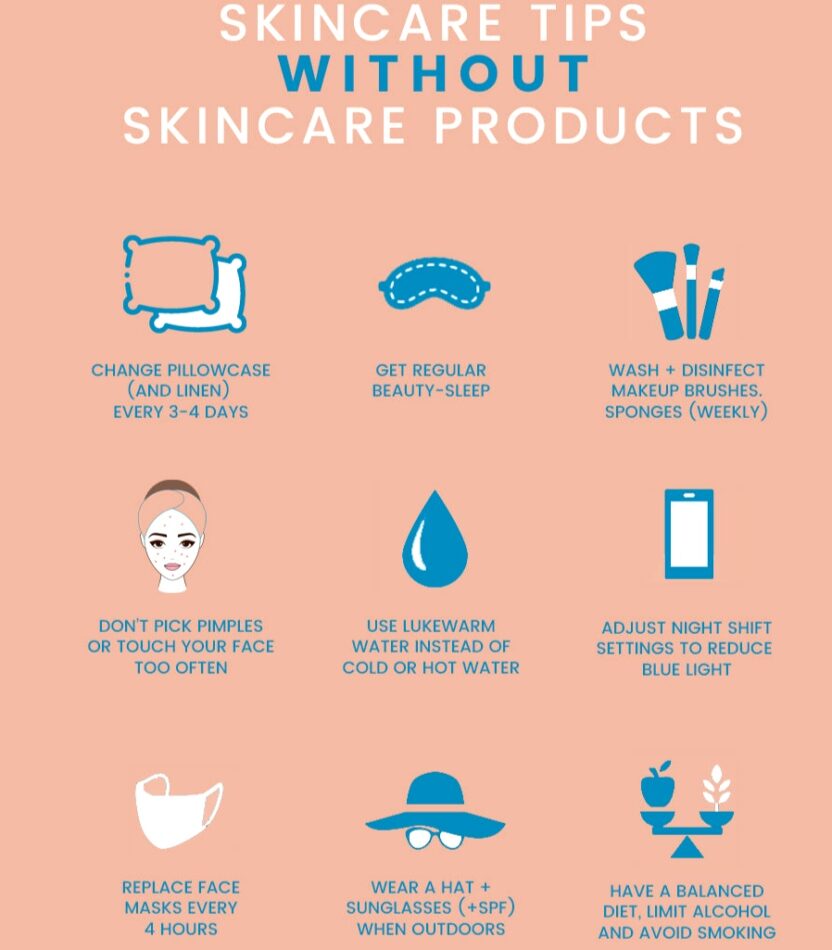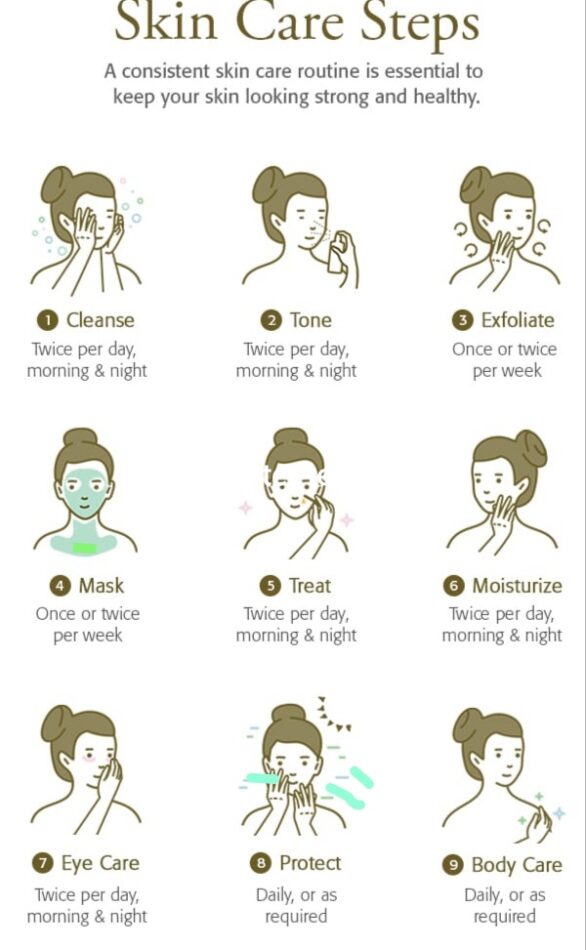Understanding Skin Care, Causing factors, Tips for Healthy, Glowing Skin
What is Skin Care
Skincare is more than just about looking good; it’s a way to maintain healthy, happy skin. Our skin is constantly exposed to the elements sun, pollution and dirt and it protects us from all sorts of things. That’s why skin care is important. Whether you want to get rid of acne, keep your skin hydrated, or simply maintain a healthy glow, having a solid skincare routine can make a big difference.
Causing factors
- Environmental Factors – Exposure to sun, pollution, and harsh weather can damage the skin, making skincare essential for protection and repair.
- Aging – As we age, our skin loses elasticity and moisture, leading to wrinkles and dryness, which requires tailored skincare routines.
- Hormonal Changes – Fluctuations in hormones, such as during puberty, menstruation, or menopause, can lead to various skin issues, including acne and sensitivity.
- Diet and Hydration – What we eat and drink can impact our skin’s health. A poor diet and dehydration can lead to dullness and breakouts.
- Skin Conditions – Issues like eczema, psoriasis, or acne require specific skincare treatments to manage symptoms and promote healing.
- Taking care of your skin helps maintain its health and appearance.
Skin Care Tips
In this guide, I’ll discuss some essential skin care tips and tricks to help you achieve healthy, glowing skin.
1. Know Your Skin Type
One of the first things you need to do when starting any skin care routine is understanding your skin type. Knowing your skin type helps you pick the right products and treatments.
- Oily Skin: If your skin feels greasy and shiny throughout the day and you notice frequent breakouts, you likely have oily skin. People with oily skin tend to have larger pores and more blackheads.
- Dry Skin: If your skin feels tight, rough, or flaky, especially after washing it, you probably have dry skin. You might notice small fine lines appearing more easily.
- Combination Skin: Many people have a combination of oily and dry skin. Typically, the T-zone (forehead, nose, chin) is oily, while other parts of the face, like the cheeks, are dry.
- Sensitive Skin: If your skin often reacts to products, feels itchy, or gets red and inflamed easily, you might have sensitive skin.

2. Cleansing twice a day Is Key
Cleansing is the foundation of any good skin care routine. Throughout the day, our skin collects dirt, oils, and makeup, which can clog pores and lead to breakouts. Cleansing twice a day morning and night is crucial for skin care.
- In the morning: Use a gentle cleanser to remove any oils and sweat that accumulated overnight.
- In the evening: It’s important to remove makeup, sunscreen, and dirt that’s built up during the day. If you wear makeup, try double cleansing. First, use an oil-based cleanser to break down makeup, then follow up with a water-based cleanser to remove everything else.
Avoid harsh soaps as they can strip your skin of its natural oils, making it dry and irritated.
3. Moisturize daily
No matter what skin type you have, daily moisturizing is essential for skin care. Moisturizers keep your skin hydrated and help protect it from environmental damage. Plus, hydrated skin looks more plump and youthful.
- For oily skin: Choose a lightweight, oil-free moisturizer that won’t clog your pores.
- For dry skin: Opt for richer, creamier moisturizers with ingredients like hyaluronic acid or ceramides to deeply hydrate and lock in moisture https://nutrimedix.online/hair-loss-and-the-2-hair-transplant-method/.
- For combination skin: A gel-based or lightweight lotion works well, offering moisture without making oily areas feel greasy.
Keeping your skin well-moisturized can also prevent premature aging and help maintain its natural glow.
4. Never Skip Sunscreen
If there’s one thing you should never skip, it’s sunscreen. Even if you’re not spending much time outdoors, UV rays from the sun can still penetrate clouds and windows, causing damage to your skin.
- SPF 30 or higher: Look for a broad-spectrum sunscreen with at least SPF 30, which will protect you from both UVA (aging) and UVB (burning) rays.
- Daily application: Apply sunscreen every morning, even if it’s cloudy or you’re mostly indoors. If you’re outside, make sure to reapply every two hours, especially after sweating or swimming.
Regular use of sunscreen can prevent sunburn, dark spots, and wrinkles, as well as reduce your risk of skin cancer.
5. Exfoliate, But Be Gentle
Exfoliation helps remove dead skin cells from the surface of your skin, revealing fresh, new skin underneath. It can also improve the effectiveness of your other skin care products, allowing them to penetrate deeper.
- Chemical exfoliants: Ingredients like AHAs (alpha hydroxy acids) and BHAs (beta hydroxy acids) dissolve dead skin cells without physically scrubbing your skin. They’re a great choice for sensitive skin or acne-prone skin.
- Physical exfoliants: These include scrubs with tiny beads or particles that manually remove dead skin. If you prefer physical exfoliants, be gentle and avoid scrubbing too hard, as this can cause tiny tears in the skin.
Exfoliating 1-3 times a week is enough for most people, but be mindful not to over-exfoliate, as this can strip your skin and cause irritation.
6. Stay Hydrated and Eat a Balanced Diet
What you eat and drink affects your skin just as much as what you put on it. Staying hydrated is essential for maintaining your skin’s elasticity and preventing dryness. Drink plenty of water throughout the day, and eat a diet rich in fruits, vegetables, and healthy fats. Foods that are high in antioxidants—like berries, leafy greens, and nuts—are particularly beneficial for skin health.
7. Use Serums for Targeted Treatments
Serums are lightweight, concentrated products that are packed with active ingredients to target specific skin concerns. Here are some common serums and what they do:
- Vitamin C: Helps brighten your skin and fade dark spots.
- Hyaluronic Acid: Hydrates and plumps up the skin, making it look smoother.
- Niacinamide: Helps with oil control, reduces redness, and improves the skin barrier.
- Retinol: Boosts collagen production and helps reduce the appearance of fine lines and wrinkles.
Serums are best applied after cleansing and before moisturizing to let the active ingredients absorb fully into your skin.
8. Avoid Touching Your Face
Throughout the day, our hands pick up bacteria, oils, and dirt. If you frequently touch your face, you’re transferring all that grime onto your skin, which can lead to clogged pores and breakouts. Try to keep your hands off your face, and avoid picking at blemishes, as this can cause scarring follow this technique for skin care.
10. Be Patient and Consistent
Good skin care takes time, so don’t expect overnight results. Stick with your routine, and give products time to work typically, you’ll start seeing changes after a few weeks. If you’re dealing with stubborn skin issues, consider seeing a dermatologist for professional advice.
11.Visit a Dermatologist
- If you’re dealing with persistent skin issues like acne, eczema, or hyperpigmentation, consult a dermatologist for professional advice and treatment options. It will guide you in a better way.

Conclusion
Caring for your skin doesn’t have to be complicated. You can keep your skin healthy and glowing by cleansing, moisturizing, and applying sunscreen. Add targeted treatments and a balanced lifestyle, and you’re well on your way to the skin you’ve always wanted. Remember, consistency is key, and a little patience is also important in skin care.


dsf7vh